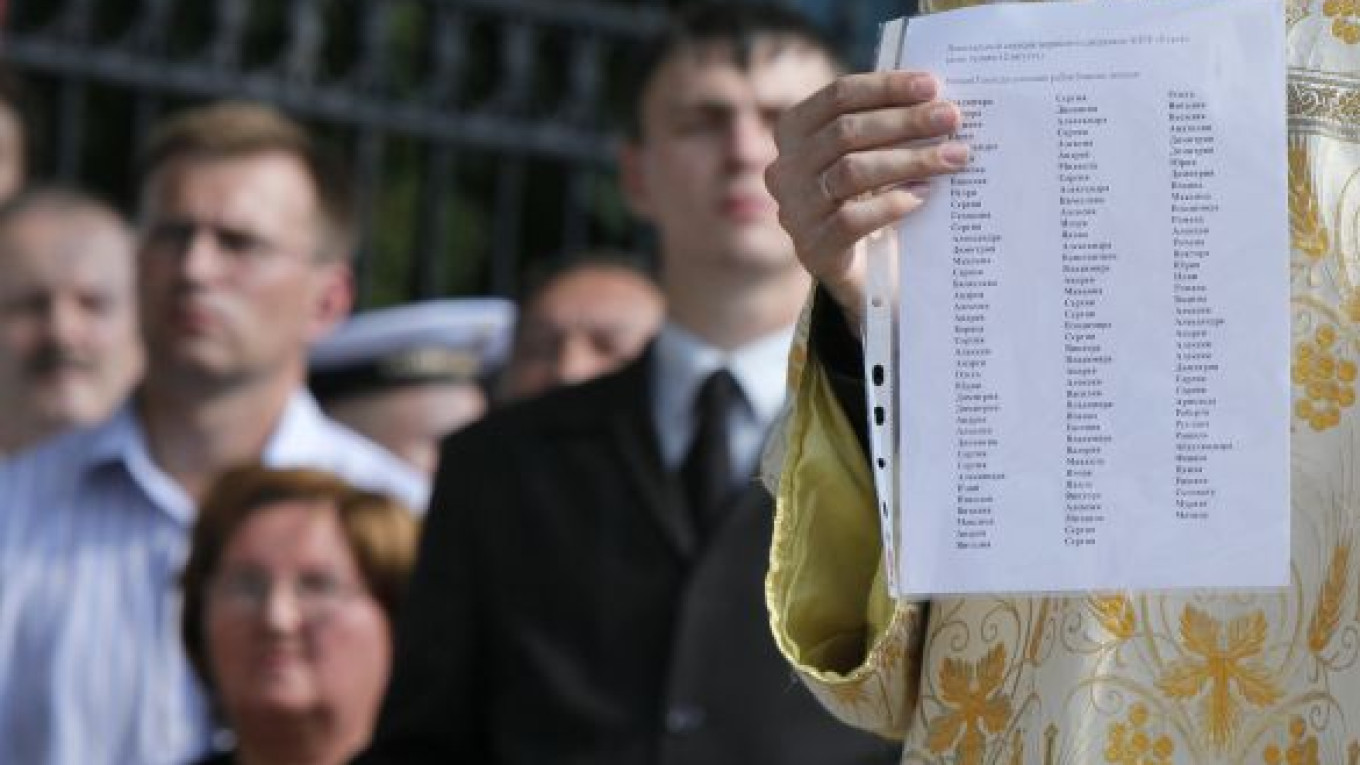Navy ships of the Northern Fleet lowered their flags and sounded their sirens at 11:44 p.m. Thursday — the exact time of the 10th anniversary of the blast that destroyed the Kursk nuclear submarine in the Barents Sea.
Memorial events were held in St. Petersburg, Murmansk, Severodvinsk, Severomorsk and Arkhangelsk, where the 118 members of the Kursk's crew are buried, Interfax reported.
All Russian Orthodox churches on Navy bases held services in memory of the sailors who died in the incident.
But officials chose to ignore the date, relatives of dead sailors said.
“We hoped that someone from the Defense Ministry or the Navy's staff would contact us for the 10th anniversary. We thought that someone from the country's authorities would come to commemorate the memory of our boys. But alas, looks like they don't think death of 118 submariners is a big tragedy,” said Sofia Dudko, mother of the Kursk's first mate, Sergei Dudko.
Neither President Dmitry Medvedev nor Prime Minister Vladimir Putin commented on the Kursk anniversary Thursday.
But the Navy has learned its lessons from the tragedy, modernizing its rescue forces, which were unable to provide help to the Kursk's crew back in 2000, a Navy spokesman said, Interfax reported.
Andrei Zvyagintsev, the first Russian rescuer to reach the Kursk after it had sunk, said two Navy rescue submarines were modernized in recent years, and all fleets received diving suits capable of operating in depths of up to 365 meters.
The Kursk came to a rest on the seabed 108 meters underwater after its hull was ravaged by a blast from one of its own torpedoes.
Twenty-three crew members survived the blast, but died before rescuers reached them nine days after the explosion, despite repeated assurances from federal authorities that the submariners would be saved.
Russian authorities initially refused help from other countries, but later accepted it. Norwegian rescuers were the first to enter the submarine on Aug. 21, 2000.
Putin, then the newly elected president, was on vacation during the incident, returning to work only five days after the Kursk blast.
On Sept. 8, 2000, he made a now-notorious comment about the situation on "Larry King Live," answering a question about what happened to the submarine with the curt remark, “It sunk.”
The Prosecutor General's Office ruled in 2002 that the Kursk incident was caused by the torpedo blast, but did not say why it exploded. No one was ever charged over the incident.
Media reports have said the Kursk could have faced a sneak attack from an American submarine or collided with such a vessel, but experts doubted this explanation.
“Those who speak about the collision with an American submarine are just trying to lay the blame at someone else's door,” Navy Captain Igor Kudrin said Thursday, Interfax reported.
“It's very convenient for us to have an American version,” he said, adding that the crew could have simply mishandled the torpedo.
Roman Kolesnikov, a former Navy captain and father of Dmitry Kolesnikov, who died on the Kursk, told Izvestia in an interview published Thursday that he considered the vessel's and its ammunition's state of disrepair, caused by a lack of financing, as the most likely explanation.
“To maintain complex equipment, you need money, and there's no money,” he said. “Try to abandon your house for 10 years, and then come and see what happens.”
A Message from The Moscow Times:
Dear readers,
We are facing unprecedented challenges. Russia's Prosecutor General's Office has designated The Moscow Times as an "undesirable" organization, criminalizing our work and putting our staff at risk of prosecution. This follows our earlier unjust labeling as a "foreign agent."
These actions are direct attempts to silence independent journalism in Russia. The authorities claim our work "discredits the decisions of the Russian leadership." We see things differently: we strive to provide accurate, unbiased reporting on Russia.
We, the journalists of The Moscow Times, refuse to be silenced. But to continue our work, we need your help.
Your support, no matter how small, makes a world of difference. If you can, please support us monthly starting from just $2. It's quick to set up, and every contribution makes a significant impact.
By supporting The Moscow Times, you're defending open, independent journalism in the face of repression. Thank you for standing with us.
Remind me later.


